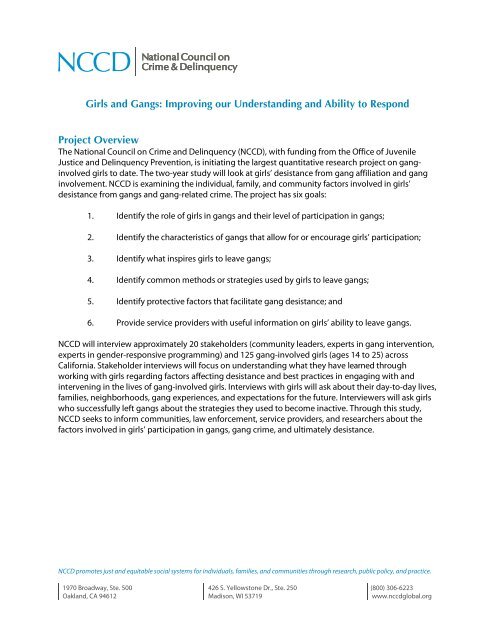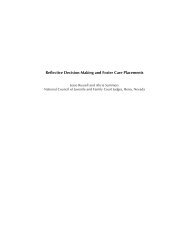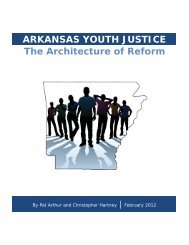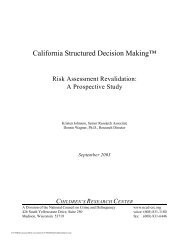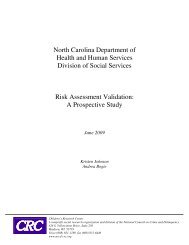Girls and Gangs - National Council on Crime & Delinquency
Girls and Gangs - National Council on Crime & Delinquency
Girls and Gangs - National Council on Crime & Delinquency
Create successful ePaper yourself
Turn your PDF publications into a flip-book with our unique Google optimized e-Paper software.
<str<strong>on</strong>g>Girls</str<strong>on</strong>g> <str<strong>on</strong>g>and</str<strong>on</strong>g> <str<strong>on</strong>g>Gangs</str<strong>on</strong>g>: Improving our Underst<str<strong>on</strong>g>and</str<strong>on</strong>g>ing <str<strong>on</strong>g>and</str<strong>on</strong>g> Ability to Resp<strong>on</strong>d<br />
Project Overview<br />
The <str<strong>on</strong>g>Nati<strong>on</strong>al</str<strong>on</strong>g> <str<strong>on</strong>g>Council</str<strong>on</strong>g> <strong>on</strong> <strong>Crime</strong> <str<strong>on</strong>g>and</str<strong>on</strong>g> <strong>Delinquency</strong> (NCCD), with funding from the Office of Juvenile<br />
Justice <str<strong>on</strong>g>and</str<strong>on</strong>g> <strong>Delinquency</strong> Preventi<strong>on</strong>, is initiating the largest quantitative research project <strong>on</strong> ganginvolved<br />
girls to date. The two-year study will look at girls’ desistance from gang affiliati<strong>on</strong> <str<strong>on</strong>g>and</str<strong>on</strong>g> gang<br />
involvement. NCCD is examining the individual, family, <str<strong>on</strong>g>and</str<strong>on</strong>g> community factors involved in girls’<br />
desistance from gangs <str<strong>on</strong>g>and</str<strong>on</strong>g> gang-related crime. The project has six goals:<br />
1. Identify the role of girls in gangs <str<strong>on</strong>g>and</str<strong>on</strong>g> their level of participati<strong>on</strong> in gangs;<br />
2. Identify the characteristics of gangs that allow for or encourage girls’ participati<strong>on</strong>;<br />
3. Identify what inspires girls to leave gangs;<br />
4. Identify comm<strong>on</strong> methods or strategies used by girls to leave gangs;<br />
5. Identify protective factors that facilitate gang desistance; <str<strong>on</strong>g>and</str<strong>on</strong>g><br />
6. Provide service providers with useful informati<strong>on</strong> <strong>on</strong> girls’ ability to leave gangs.<br />
NCCD will interview approximately 20 stakeholders (community leaders, experts in gang interventi<strong>on</strong>,<br />
experts in gender-resp<strong>on</strong>sive programming) <str<strong>on</strong>g>and</str<strong>on</strong>g> 125 gang-involved girls (ages 14 to 25) across<br />
California. Stakeholder interviews will focus <strong>on</strong> underst<str<strong>on</strong>g>and</str<strong>on</strong>g>ing what they have learned through<br />
working with girls regarding factors affecting desistance <str<strong>on</strong>g>and</str<strong>on</strong>g> best practices in engaging with <str<strong>on</strong>g>and</str<strong>on</strong>g><br />
intervening in the lives of gang-involved girls. Interviews with girls will ask about their day-to-day lives,<br />
families, neighborhoods, gang experiences, <str<strong>on</strong>g>and</str<strong>on</strong>g> expectati<strong>on</strong>s for the future. Interviewers will ask girls<br />
who successfully left gangs about the strategies they used to become inactive. Through this study,<br />
NCCD seeks to inform communities, law enforcement, service providers, <str<strong>on</strong>g>and</str<strong>on</strong>g> researchers about the<br />
factors involved in girls’ participati<strong>on</strong> in gangs, gang crime, <str<strong>on</strong>g>and</str<strong>on</strong>g> ultimately desistance.<br />
NCCD promotes just <str<strong>on</strong>g>and</str<strong>on</strong>g> equitable social systems for individuals, families, <str<strong>on</strong>g>and</str<strong>on</strong>g> communities through research, public policy, <str<strong>on</strong>g>and</str<strong>on</strong>g> practice.<br />
1970 Broadway, Ste. 500<br />
Oakl<str<strong>on</strong>g>and</str<strong>on</strong>g>, CA 94612<br />
426 S. Yellowst<strong>on</strong>e Dr., Ste. 250<br />
Madis<strong>on</strong>, WI 53719<br />
(800) 306-6223<br />
www.nccdglobal.org
NCCD Research Team<br />
• Angela Wolf, Director of Research<br />
• Angela Del Prado Lippman, Project Manager<br />
• Estivaliz Castro, Research Associate<br />
• Livier Gutierrez, Research Associate<br />
<str<strong>on</strong>g>Girls</str<strong>on</strong>g> <str<strong>on</strong>g>and</str<strong>on</strong>g> <str<strong>on</strong>g>Gangs</str<strong>on</strong>g> Advisory Board<br />
• Aquil Basheer<br />
• DeV<strong>on</strong>e Boggan<br />
• Dawn Brown<br />
• Shi Cota<br />
• Dr. David Springer<br />
• Kevin Grant<br />
• M<strong>on</strong>ique Morris<br />
• John Torres<br />
Publicati<strong>on</strong>s <str<strong>on</strong>g>and</str<strong>on</strong>g> Webinars<br />
Forthcoming


